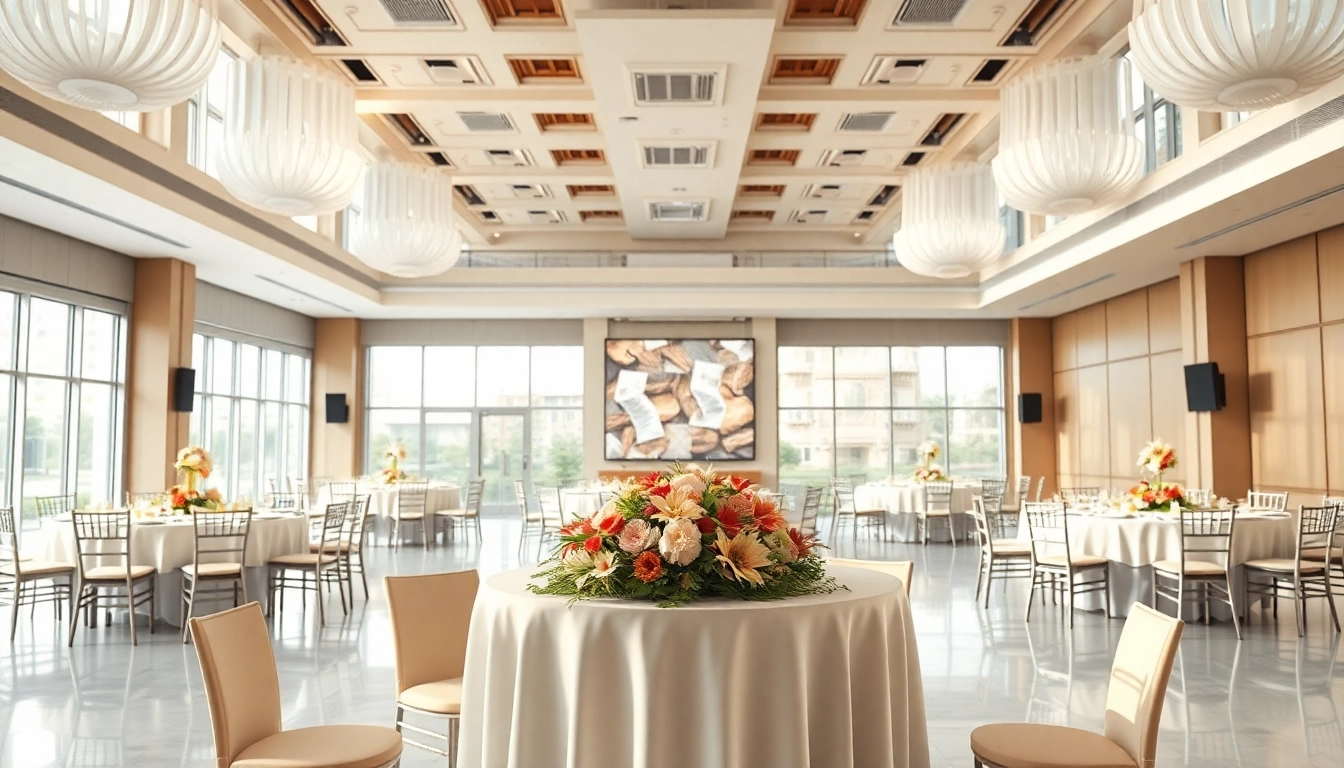Understanding the City Venue Event Center
When it comes to hosting events, the city venue event center stands out as a cornerstone for creating memorable experiences. These centers are often designed to accommodate a variety of gatherings, from weddings and corporate events to private parties, making them an essential part of the event planning landscape. But what exactly defines a city venue event center, and how can it elevate your event? Let’s delve into the details.
What Is a City Venue Event Center?
A city venue event center serves as a multifunctional space equipped to host various types of events. These centers differ in size, style, and amenities but typically feature a large main hall, catering facilities, and support for audiovisual equipment. They are often recognized for their unique architectural designs, catering to the aesthetic preferences of diverse clientele. The goal is to provide a blank slate that can be modified to fit the theme and purpose of any event.
Key Features of City Venue Event Center
Several characteristics set city venue event centers apart:
- Versatile Spaces: Most city venue event centers offer a variety of room layouts, allowing planners to configure the space according to their event’s needs.
- Modern Amenities: Facilities are often equipped with state-of-the-art audiovisual technology, Wi-Fi access, and climate control to ensure guest comfort.
- Catering Options: Many centers boast on-site catering services or partnerships with local caterers, making meal planning seamless.
- Accessibility: They are usually located in central areas, making them easily accessible for attendees, which is crucial for events that may attract large audiences.
- Coordination Services: Some venues provide event planners or coordinators who help streamline the entire process, making organization easier for clients.
The Benefits of Choosing a City Venue Event Center
Choosing a city venue event center can be advantageous for various reasons:
- Convenience: With everything you need in one location, from space to catering, event planning becomes more manageable.
- Customization: The versatility of these centers allows you to create a unique atmosphere tailored to your event, whether formal or casual.
- Reputation: Established venues often have a strong reputation in the community, giving clients assurance regarding the quality of service provided.
- Cost-Effectiveness: Bundled services and package deals can often lead to savings when compared to booking separate services from different providers.
Choosing the Right Venue for Your Event
Finding the perfect venue can feel overwhelming, but considering the right factors can simplify the process. The city venue event center is an excellent starting point in this journey.
Factors to Consider When Selecting a City Venue Event Center
When choosing a venue, consider the following:
- Location: The venue’s proximity to major transportation links can greatly influence attendance. Choose a venue that is easy to reach, with ample parking or public transport options.
- Size and Capacity: Ensure the venue can accommodate your anticipated number of guests comfortably. Overcrowding can lead to discomfort, while too much empty space can detract from the atmosphere.
- Accessibility: Ensure that the venue is accessible to all guests, including those with disabilities. This includes wheelchair access, seating arrangements, and restroom facilities.
- Ambiance: The venue’s aesthetic should align with your event’s theme. A modern space may be perfect for corporate functions but could feel out of place for a rustic wedding.
- Availability: Popular venues may book up quickly, especially during peak season. Check availability well in advance to secure your desired date.
How to Assess Venue Capacity and Amenities
Understanding the spatial dynamics and available amenities can enhance your event experience. Here’s how to assess these factors:
- Site Visits: Always perform an on-site tour to get a feel for the space. Check the layout, accessibility, and condition of facilities thoroughly.
- Capacity Charts: Many venues provide official capacity charts for different setups—choose table arrangements and seating styles that maximize comfort.
- Contractual Obligations: Review the venue’s contracts closely for provisions on service hours, included amenities, and cancellation policies.
Common Mistakes to Avoid When Booking
Avoiding common pitfalls can save you time, money, and stress. Here are some mistakes to watch out for:
- Rushing the Process: Take your time to research and compare different venues. Don’t settle for the first one that fits your general requirements.
- Unclear Communication: Ensure clarity on all terms, conditions, and expectations to avoid misunderstandings later.
- Neglecting the Fine Print: Read through contracts thoroughly. Hidden fees or clauses can drastically change your budget.
Popular Events Held at City Venue Event Center
The versatility of a city venue event center means it can accommodate a wide array of events. Here’s a closer look at some popular uses:
Weddings and Receptions
Weddings are perhaps the most romanticized events held at city venue event centers. Couples appreciate the flexibility of space arrangements, allowing for unique ceremonies and receptions. Some key considerations include:
- Decor and Aesthetics: Choose a venue that reflects your style. Many centers offer decoration services to align the space with your vision.
- Catering Options: Ensure that the menu suits your preferences and those of your guests. A diverse menu can enhance the overall experience.
- Coordination Services: Opt for venues that provide event coordinators to assist in the planning process, ensuring that the day runs smoothly from start to finish.
Corporate Functions and Conferences
The corporate world values professionalism and functionality. City venue event centers often cater to various corporate needs:
- Meeting Spaces: Features such as breakout rooms and audiovisual capabilities are essential for effective presentations and discussions.
- Networking Opportunities: A well-planned corporate event can facilitate crucial connections, making the venue layout and ambiance vital in fostering networking.
- Accessibility of Services: Offering catering and technology support can enhance the ease of managing corporate functions.
Private Parties and Social Gatherings
Whether it’s a birthday party, family reunion, or milestone celebration, city venue event centers can accommodate various social gatherings effectively:
- Customizable Options: Many centers provide packages that can be tailored to fit the theme of private events, ensuring it resonates with guests.
- Entertainment Facilities: Consider venues with options for music and entertainment. This could be a built-in sound system or space for live performances.
- Exclusive Rentals: Private gatherings may benefit from venues offering exclusive access to ensure privacy during the event.
Event Planning Tips for a Successful Experience
Planning an event can feel overwhelming. However, strategic organization can lead to successful outcomes. Below are several actionable tips to enhance your event planning efforts:
Creating a Comprehensive Event Checklist
A well-structured checklist can significantly streamline your planning process:
- Define Your Goal: Clearly state the purpose of your event—this will guide all subsequent decisions, from venue choice to catering.
- Create a Timeline: Set a schedule with deadlines for booking venues, catering, decorations, and sending invitations to stay on track.
- Budget Planning: Allocate a budget that accounts for all aspects of the event, ensuring there is flexibility for unexpected costs.
Selecting the Right Vendors and Services
Choosing reliable vendors can immensely impact the success of your event. Consider the following:
- Research: Look for reviews or testimonials about potential vendors. Word of mouth can be an excellent indicator of reliability.
- Get Quotes: Request quotes from multiple vendors to compare prices and services, ensuring you select the best fit for your budget.
- Schedule a Meeting: Engage with potential vendors to evaluate their understanding of your vision and preferences.
Event Promotion Strategies for Better Attendance
Attracting attendees is critical to any successful event. Here are some effective strategies:
- Social Media Marketing: Leverage platforms like Facebook, Instagram, and LinkedIn to create awareness and excitement around your event.
- Email Campaigns: Utilize emails to remind your audience about event details, encourage registrations, and provide follow-ups.
- Partnerships: Collaborate with local businesses or influencers who can share your event with their audiences.
Maximizing Your Experience at City Venue Event Center
To truly maximize the experience offered by a city venue event center, attendees and planners alike can take specific actions that enhance every aspect of the event:
Utilizing Space Effectively for Different Events
Understanding how to utilize a city venue event center’s space can improve the flow and engagement of your event:
- Layout Planning: Review the venue’s layout options to create a flow that facilitates engaging interactions among attendees.
- Signage and Direction: Use clear signage to direct guests throughout the venue, ensuring they know where to go for specific activities or amenities.
- Flexible Spaces: Opt for venues that allow for different space configurations to adapt to various movements throughout the event.
Enhancing Guest Experience with Decor and Amenities
The right decor and amenities can significantly uplift the overall experience for attendees:
- Aesthetic Elements: Choose decor that reflects your event’s theme and sets the desired atmosphere—this could include lighting, centerpieces, and stage designs.
- Comfort Measures: Ensure the venue is equipped with sufficient seating, climate control, and facilities to enhance attendee comfort throughout the event.
- Interactive Features: Consider incorporating interactive elements such as photo booths, activities, or live entertainment to engage guests actively.
Feedback and Follow-Up: A Key to Future Events
Collecting feedback is essential for continuous improvement. After the event:
- Surveys: Distribute surveys to gather insights on guests’ experiences and any areas for improvement.
- Thank You Messages: Following up with thank-you messages can nurture relationships and foster continued engagement for future events.
- Performance Metrics: Analyze metrics, such as attendee engagement and social media reach, to assess the overall success of the event and inform future planning.



